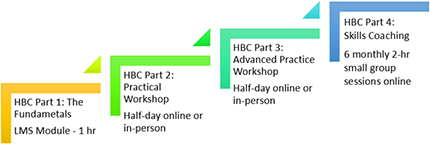
| WRHA Staff & Health Professionals Home |
|
Primary Care Providers Health Behaviour Change HBC is a clinical skill set that can be utilized during conversations with clients related to behaviours that impact health. HBC provides tools to engage with clients in a way that increases the likelihood of change towards healthier behaviors and outcomes. HBC is based on Stages of Change and Motivational Interviewing skills. Frequently Asked Questions for Health Professionals
Why is HBC important? Studies demonstrate improved outcomes including client improvements in following rehabilitation programs, managing addictions, quitting smoking, taking medications as directed, eating a healthy diet, getting exercise, and practicing safer sex.
How do I access training? A four-part education series has been developed.
HBC Core Training is a two-part course: Health Behaviour Change Part 1: The Fundamentals, is an online course in the Learning Management System (LMS). It takes 40-60 minutes to complete. Health Behaviour Change Part 2: Practical Workshop. This is a half-day skills-based session offered live online. Advanced Training Opportunities: Health Behaviour Change Part 3: Advanced Practice Workshop offers an opportunity for those who have been using HBC skills in their practice to deepen those skills by practicing with others health professionals and the HBC training team. Health Behaviour Change Part 4: Skills Coaching is a series of 6 monthly online small group meetings (2 hours each) where participants will bring cases and receive coaching in HBC strategies and application to promote further integration into clinical practice. Sign-up for all sessions on the LMS. Click on the Courses / Registration tab at the top, then Clinical Skills > Health Care Initiatives). Please note an account is required to use the LMS. The home page contains information, how to use the LMS including how to create an account, which browsers are compatible with the LMS and other pertinent information. Who should be trained? This training is encouraged as a core competency for all health professionals. It is recommended that managers work with their teams to co-ordinate a training plan. It is encouraged that all team members have some training in HBC, so managers are asked to plan how each team member who has not had training on this recently can be scheduled to attend. It may be desirable for an entire team to complete the LMS and then attend a live session together, or it may only be feasible to stagger the team members’ training throughout the year. What does this mean to me? As care providers, we have committed to enhancing client experience and delivering quality, caring services that promote health and well-being. Utilizing HBC in clinical practice will promote positive outcomes and engagement. Therefore, teams are requested to strategize for how HBC will be embedded and sustained in everyday practice. Training is only the first step; changing practice is the key to seeing better outcomes. Managers need to lead discussions with their teams about how to support this practice (in case conferences, individual practice, etc.) and ensure awareness of the available tools and resources. Where Do I Access Additional HBC Tools and Resources?
For further skill development, the following options are listed for consideration. Please note the WRHA does not endorse any external site or program linked here:
MINT website (Motivational Interviewing Network of Trainers): motivationalinterviewing.org For Trained Facilitators: The following is to be used in Part 2 In-Person Workshop. We encourage Facilitators at Group sessions to refer Participants to this link where these training materials can be used as a reference: Health Behaviour Change Part 2: Participant HandoutsHealth Behaviour Change Part 2: Presenter's Toolkit Health Behaviour Change Self-Assessment Survey
|
 |
This site is not intended to be used by the general public. If you are not a health care professional or a WRHA staff member, please refer to our public website. |
